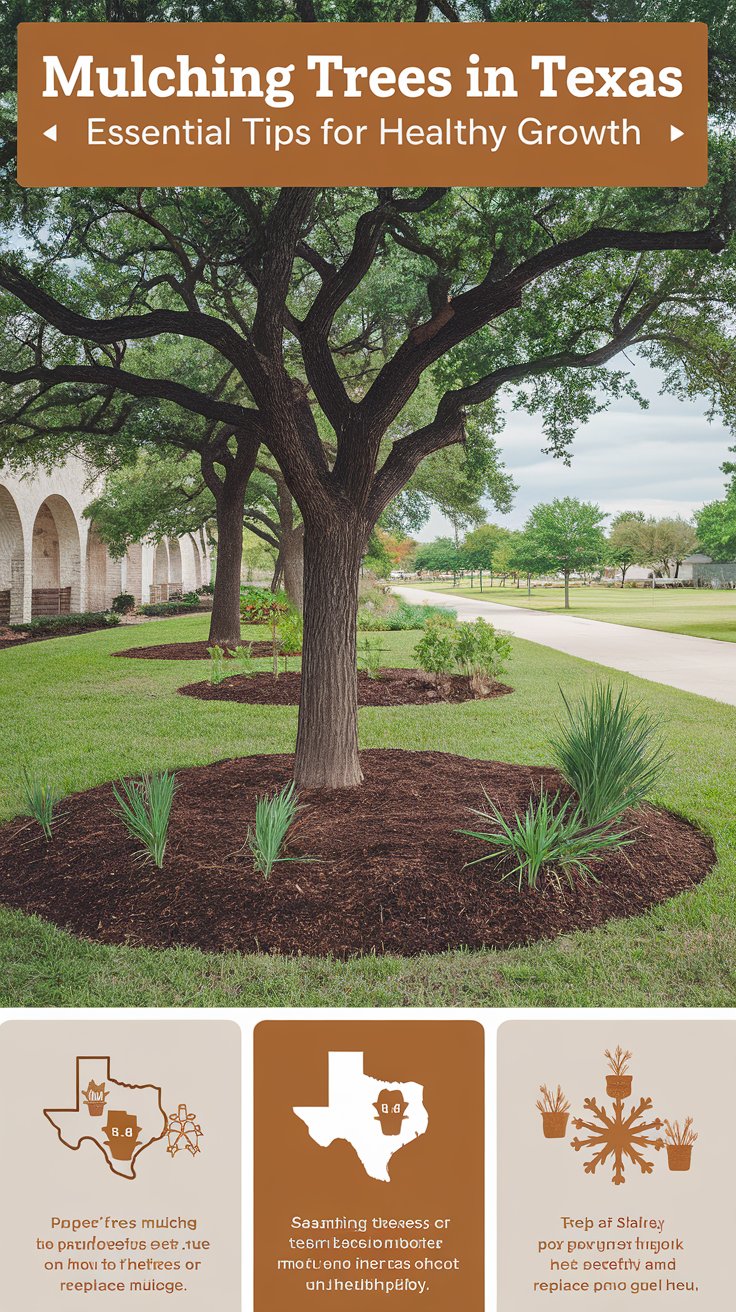Discover when and how to replace mulch around trees in Texas. Learn expert tips on mulch selection, application techniques, and maintenance for healthy trees in 2024.
Replacing mulch around trees in Texas is essential for optimal tree health and growth. The hot Texas climate, varying soil conditions, and seasonal changes make annual mulch replacement crucial. However, timing and proper techniques are key to ensuring your trees benefit from fresh mulch application.
Hello, I’m Ashley Scott, a certified arborist with 15 years of experience in Texas tree care. Today, I’ll share my expertise on mulch replacement around trees in our unique Texas climate.
Why Replace Mulch in Texas?

Climate Factors
- Intense summer heat
- Irregular rainfall patterns
- Extended drought periods
- Extreme temperature fluctuations
Benefits of Fresh Mulch
- Moisture retention
- Temperature regulation
- Weed suppression
- Soil enrichment
- Root protection
When to Replace Mulch in Texas
Optimal Timing
- Early spring (March-April)
- Fall (September-October)
- Before extreme weather patterns
Regional Considerations
North Texas
- Replace before summer heat
- Additional layer before winter
- Monitor after heavy rains
Central Texas
- Early spring replacement
- Mid-fall maintenance
- Check after flash floods
South Texas
- Replace before hurricane season
- Monitor during drought periods
- Adjust for coastal conditions
/do-scarecrows-work/
How to Replace Mulch
Step-by-Step Process
- Assessment
Check existing mulch condition
- Measure decomposition rate
- Evaluate soil moisture
- Removal
Remove excess old mulch
- Keep beneficial decomposed layer
- Clear debris and weeds
- Application
Maintain 3-4 inch depth
- Keep away from trunk
- Create proper diameter
Best Mulch Types for Texas Trees
Organic Options
- Hardwood Mulch
Long-lasting
- Good moisture retention
- Local availability
- Pine Bark
Excellent drainage
- pH balanced
- Slow decomposition
- Cedar Mulch
Natural pest resistance
- Pleasant aroma
- Drought tolerant
Inorganic Options
- River Rock
Permanent solution
- Good for windy areas
- Heat resistant
- Crushed Granite
Natural appearance
- Excellent drainage
- Low maintenance
/native-ornamental-grasses/
Common Mistakes to Avoid
- Volcano Mulching
Causes trunk rot
- Promotes root problems
- Reduces oxygen flow
- Improper Depth
Too thin: ineffective protection
- Too thick: root suffocation
- Uneven distribution
- Wrong Timing
During extreme heat
- Before heavy rains
- During tree dormancy
Seasonal Maintenance Tips
Spring
- Remove winter-damaged mulch
- Check for compaction
- Apply fresh layer
Summer
- Monitor moisture levels
- Add light layer if needed
- Prevent weed growth
Fall
- Prepare for winter
- Adjust depth for temperature
- Clear fallen leaves
Winter
- Maintain existing mulch
- Monitor for erosion
- Protect root systems
Cost Considerations
DIY vs Professional
- **Materials cost: **$3-8 per bag
- Professional service: $100-300 per tree
- Long-term maintenance savings
Bulk vs Bagged
- **Bulk pricing: **$30-45 per cubic yard
- Delivery fees: $50-100
- Quality considerations
Tree-Specific Guidelines
Large Shade Trees
- Extended mulch ring
- Deeper application
- Regular replacement
Ornamental Trees
- Smaller mulch ring
- Decorative options
- Careful depth control
Fruit Trees
- Organic mulch preferred
- pH monitoring
- Nutrient consideration
Environmental Impact
Sustainability
- Local sourcing
- Recycled materials
- Water conservation
Wildlife Benefits
- Habitat creation
- Insect management
- Ecosystem support
Advanced Tips for 2024
Smart Monitoring
- Moisture sensors
- pH testing
- Temperature tracking
Innovative Materials
- Biodegradable options
- Water-retention additives
- Enhanced nutrients
Professional Consultation
When to Call an Arborist
- Large property maintenance
- Disease concerns
- Complex tree issues
Questions to Ask
- Experience in Texas
- Local references
- Insurance coverage
/juniper-bonsai-light-burn/
Replacing mulch around trees in Texas is crucial for maintaining healthy trees in our challenging climate. By following proper timing, techniques, and maintenance schedules, you can ensure your trees receive maximum benefits from mulch application. Remember to consider your specific region, tree types, and local climate conditions when planning your mulch replacement strategy.
FAQs
- How often should I replace mulch in Texas?
Generally annually, with seasonal touch-ups
- What’s the best mulch for Texas heat?
Hardwood or cedar mulch for most situations
- Can I reuse old mulch?
Partially decomposed mulch can be incorporated into new layer
- How much does professional mulching cost?
Average $100-300 per tree depending on size
- Should I remove all old mulch before adding new?
No, keep beneficial decomposed layer
For more gardening tips and plant care guides, visit usagardenhub.com
